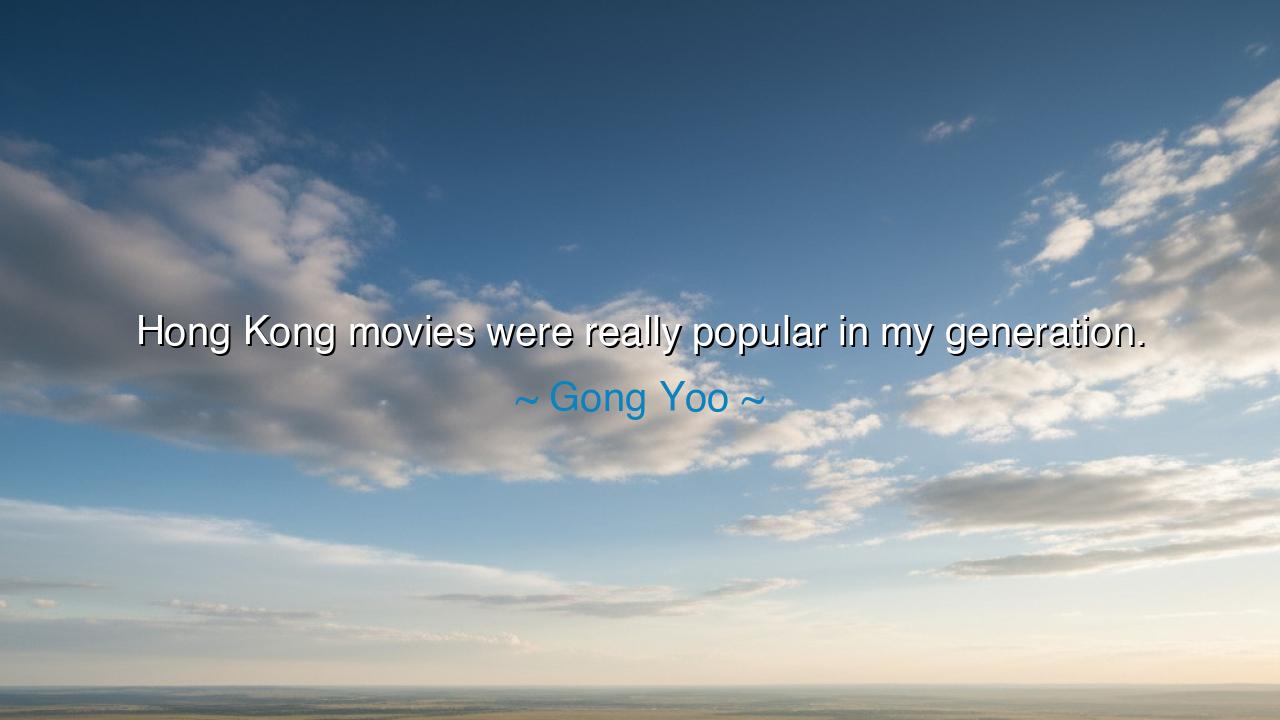
Hong Kong movies were really popular in my generation.






In the course of human history, few things have united people as strongly as the power of storytelling. The art of cinema, like the epic tales of ancient bards and philosophers, has the power to shape culture, influence generations, and leave a lasting imprint on the collective soul. Gong Yoo’s reflection, “Hong Kong movies were really popular in my generation,” speaks not only to a specific cultural phenomenon but also to the timeless nature of storytelling—how the films of one era become the defining cultural touchstone of another. This quote invites us to reflect on the powerful role that cinema plays in shaping our identities, our dreams, and our collective memory.
In the ancient world, storytelling was not just a means of entertainment but a sacred duty. The Greeks, for example, revered the works of Homer—the Iliad and the Odyssey—as the very foundation of their culture, the source of their values and virtues. These stories were memorialized, passed down from generation to generation, not just to entertain, but to teach. Much like the Hong Kong films of the 20th century, which captivated audiences with their intense action, emotional depth, and reflection on society, the ancient stories told through the bards carried the weight of cultural identity and history. They were stories that defined what it meant to be part of a shared civilization.
Hong Kong cinema, with its colorful vibrancy, dynamic action sequences, and deep connection to both Eastern and Western sensibilities, emerged as a global cultural force in the 1980s and 1990s. It was an era when filmmakers like Bruce Lee and Jackie Chan not only entertained but also shaped a global cultural landscape. Their movies were more than just action-packed spectacles; they embodied values of bravery, loyalty, and honor—themes that resonate deeply in the human spirit. Just as the ancient epic heroes of Greece and Rome were models of human virtue, these cinematic icons became the heroes of their generation, symbols of the fight against injustice, and the triumph of the human will. Gong Yoo’s words remind us that the films of Hong Kong, like the stories of old, are not just fleeting moments of entertainment; they are part of a larger narrative that shapes the collective consciousness of a generation.
In the context of Gong Yoo’s reflection, we see how the popularity of Hong Kong films in his generation mirrors the universal appeal of great storytelling. The cinema of Hong Kong became a medium through which a new generation could find meaning, connection, and understanding. In the same way that the Romans saw their gladiators as reflections of virtue and strength, so too did fans of Hong Kong action films see the protagonists as representations of courage and resilience. These movies provided more than just an escape; they were a form of cultural transmission, offering younger generations a lens through which they could understand their world, their struggles, and their place in history.
In the modern world, just as Greek tragedies reflected the tensions between fate and free will, Hong Kong movies often explored themes of fate, family, and the battle between good and evil. This speaks to the eternal human struggle for justice, freedom, and honor—principles that, whether in the ancient world or modern times, continue to shape our aspirations and our actions. For those who grew up in the era of Hong Kong cinema, these films were not just a form of entertainment; they were educational tools, offering valuable lessons on the human condition, inspiring hope, and forging a shared cultural identity. Just as Homer’s epics taught the Greeks lessons in virtue and heroism, Hong Kong films taught the values of bravery and determination, even in the face of overwhelming odds.
The lesson embedded in Gong Yoo’s words is one of continuity and connection. Just as the stories of Homer and Virgil shaped the ancient world, so too do the films of our time shape our world today. Each generation leaves its own cultural footprint, and the films that define our era serve as a reflection of our values, dreams, and struggles. Hong Kong cinema helped define a generation, much as the films of Hollywood or the epic poetry of antiquity defined others. These works continue to serve as inspiration, helping future generations find their way and understand the lessons of the past. The power of storytelling is undiminished, and its impact is eternal.
As we look to the future, let us remember that the stories we consume today—whether through film, literature, or art—will become the cultural touchstones for those who follow. Just as the Greeks, the Romans, and countless civilizations before them shaped the collective imagination with their art, so too must we ensure that the stories we tell reflect the highest ideals of humanity. Whether in the action-packed world of Hong Kong cinema or the quiet wisdom of philosophical treatises, the message remains the same: art is a tool for connection, a way for us to understand ourselves, and through reflection, to build a better future.
In our own lives, we must strive to understand the legacy of the stories we tell and consume. Let us ensure that the stories we create and the ones we choose to embrace continue to inspire the values of honor, resilience, and unity for future generations. Like the heroes of ancient epics and the iconic figures of Hong Kong cinema, we too can leave a lasting mark on the world, not only through the battles we fight but through the stories we share.






AAdministratorAdministrator
Welcome, honored guests. Please leave a comment, we will respond soon